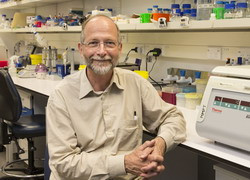The Kiwi bone expert who led a study that found vitamin D supplements – widely used to treat bone disorders – have no significant benefits on bone density has been awarded one of the country’s highest health research honours.
University of Auckland Distinguished Professor Ian Reid was tonight presented with the Health Research Council of New Zealand’s (HRC) Liley Medal at the 2015 Research Honours Dinner for his outstanding contribution to health and medical sciences in advancing treatment of the bone disorder osteoporosis. Sir William (Bill) Liley, who the medal is named after, was a New Zealand clinical researcher whose pioneering work improved the rate of still births.
Professor Reid says he and his bone research team are honoured to be recognised in this way.
“When I first came to the medical school in Auckland, Bill Liley was the pre-eminent researcher from our medical school, and so to have a medal with his name attached to it is very flattering.“
Vitamin D has long been considered the standard treatment for a number of bone disorders, including osteoporosis, because of its key role in helping to absorb calcium from the diet. However, last year Professor Reid was lead author on a potentially game-changing publication in the Lancet that raised serious questions about the effectiveness of this practice.
Professor Reid and co-researcher Associate Professor Mark Bolland performed a meta-analysis to assess the effects of vitamin D on bone density from previous studies worldwide. Data from 23 trials involving more than 4000 patients showed no evidence that bone density significally improved after taking vitamin D supplements.
Although extremely low levels of vitamin D are bad for bone, the researchers found that once a certain minimal level was reached, there was no further benefit from taking more of the vitamin.
Professor Reid says it’s become a mantra that vitamin D is good for bone.
“Some of the hype around vitamin D probably has a commercial origin, while some of it comes from people interpreting studies of association and reading into that causation.”
There has been a progressive increase in the use of vitamin D supplements over the past decade. These supplements are costly – and the cost of blood tests to determine if the supplementation is adequate, even higher.
“Our paper was an important step in turning around the whole hyping up of vitamin D. There are several other studies recently reported, and others yet to come, that I think will conclude that process,” says Professor Reid.
HRC Chief Executive Professor Kath McPherson says this study, which was funded by the HRC, has changed – and will likely continue to change – practice in the osteoporosis field.
“These findings add to others from Professor Reid’s team concerning treatment for osteoporosis that are already influencing changes in health care policy and practice on a global scale. They will lead to better health for women and reduced health care costs in the future,” says Professor McPherson.
Professor Reid is currently leading a $5 million HRC-funded programme that will help understand why osteoporosis develops in old age, and advance its treatment and that of gout, both common musculoskeletal problems in older New Zealanders. The programme includes developing bone substitutes that can be used to promote healing of severe fractures or large areas of damaged bone.
Liley Medal video 2015 from Health Research Council of NZ on Vimeo.
